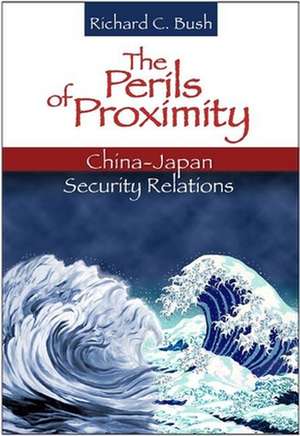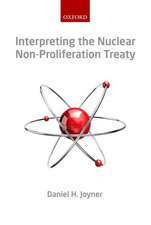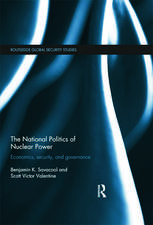The Perils of Proximity: China-Japan Security Relations
Autor Richard C. Bushen Limba Engleză Paperback – 15 iul 2013
The rivalry between Japan and China has a long and sometimes brutal history, and they continue to eye each other warily as the balance of power tips toward Beijing. They cooperate and compete at the same time, but if competition deteriorates into military conflict, the entire world has much to lose. The Perils of Proximity evaluates the chances of armed conflict between China and Japan, presenting in stark relief the dangers it would pose and revealing the steps that could head off such a disastrous turn of events.
Richard Bush focuses his on the problematic East China Sea region. Although Japan's military capabilities are more considerable than some in the West realize, its defense budget has remained basically flat in recent years. Meanwhile, Chinese military expenditures have grown by double digits annually. Moreover, that the emphasis of China's military modernization is on power projection—the ability of its air and naval forces to stretch their reach to the east, thus encroaching on its island neighbor.
Tokyo regards the growth of Chinese power and its focus on the East China Sea with deep anxiety. How should they respond? The balance of power is changing, and Japan must account for that uncomfortable fact in crafting its strategy. It is incumbent on China, Japan, and the United States to take steps to reduce the odds of clash and conflict in the East China Sea, and veteran Asia analyst Bush presents recommendations to that end. The steps he suggests won't be easy, and effective political leadership will be absolutely critical. If implemented fully and correctly, however, they have the potential of reducing the perils of proximity in Asia.
Richard Bush focuses his on the problematic East China Sea region. Although Japan's military capabilities are more considerable than some in the West realize, its defense budget has remained basically flat in recent years. Meanwhile, Chinese military expenditures have grown by double digits annually. Moreover, that the emphasis of China's military modernization is on power projection—the ability of its air and naval forces to stretch their reach to the east, thus encroaching on its island neighbor.
Tokyo regards the growth of Chinese power and its focus on the East China Sea with deep anxiety. How should they respond? The balance of power is changing, and Japan must account for that uncomfortable fact in crafting its strategy. It is incumbent on China, Japan, and the United States to take steps to reduce the odds of clash and conflict in the East China Sea, and veteran Asia analyst Bush presents recommendations to that end. The steps he suggests won't be easy, and effective political leadership will be absolutely critical. If implemented fully and correctly, however, they have the potential of reducing the perils of proximity in Asia.
Preț: 241.14 lei
Nou
Puncte Express: 362
Preț estimativ în valută:
46.14€ • 49.34$ • 38.47£
46.14€ • 49.34$ • 38.47£
Carte tipărită la comandă
Livrare economică 17 aprilie-01 mai
Preluare comenzi: 021 569.72.76
Specificații
ISBN-13: 9780815725473
ISBN-10: 0815725477
Pagini: 421
Ilustrații: black & white illustrations
Dimensiuni: 152 x 229 x 25 mm
Greutate: 0.64 kg
Editura: Brookings Institution Press
Colecția Brookings Institution Press
ISBN-10: 0815725477
Pagini: 421
Ilustrații: black & white illustrations
Dimensiuni: 152 x 229 x 25 mm
Greutate: 0.64 kg
Editura: Brookings Institution Press
Colecția Brookings Institution Press
Notă biografică
Richard C. Bush's two-decade public service career spans Congress, the intelligence community, and the U.S. State Department. He currently focuses on China-Taiwan relations, U.S.-China relations, the Korean peninsula, and Japan's security. He is the author of, among other works, Uncharted Strait: The Future of China-Taiwan Relations (Brookings, 2012).
Descriere
The rivalry between Japan and China has a long and sometimes brutal history, and they continue to eye each other warily as the balance of power tips toward Beijing. They cooperate and compete at the same time, but if competition deteriorates into military conflict, the entire world has much to lose. The Perils of Proximity evaluates the chances of armed conflict between China and Japan, presenting in stark relief the dangers it would pose and revealing the steps that could head off such a disastrous turn of events.
Richard Bush focuses his on the problematic East China Sea region. Although Japan's military capabilities are more considerable than some in the West realize, its defense budget has remained basically flat in recent years. Meanwhile, Chinese military expenditures have grown by double digits annually. Moreover, that the emphasis of China's military modernization is on power projection—the ability of its air and naval forces to stretch their reach to the east, thus encroaching on its island neighbor.
Tokyo regards the growth of Chinese power and its focus on the East China Sea with deep anxiety. How should they respond? The balance of power is changing, and Japan must account for that uncomfortable fact in crafting its strategy. It is incumbent on China, Japan, and the United States to take steps to reduce the odds of clash and conflict in the East China Sea, and veteran Asia analyst Bush presents recommendations to that end. The steps he suggests won't be easy, and effective political leadership will be absolutely critical. If implemented fully and correctly, however, they have the potential of reducing the perils of proximity in Asia.
Richard Bush focuses his on the problematic East China Sea region. Although Japan's military capabilities are more considerable than some in the West realize, its defense budget has remained basically flat in recent years. Meanwhile, Chinese military expenditures have grown by double digits annually. Moreover, that the emphasis of China's military modernization is on power projection—the ability of its air and naval forces to stretch their reach to the east, thus encroaching on its island neighbor.
Tokyo regards the growth of Chinese power and its focus on the East China Sea with deep anxiety. How should they respond? The balance of power is changing, and Japan must account for that uncomfortable fact in crafting its strategy. It is incumbent on China, Japan, and the United States to take steps to reduce the odds of clash and conflict in the East China Sea, and veteran Asia analyst Bush presents recommendations to that end. The steps he suggests won't be easy, and effective political leadership will be absolutely critical. If implemented fully and correctly, however, they have the potential of reducing the perils of proximity in Asia.




















